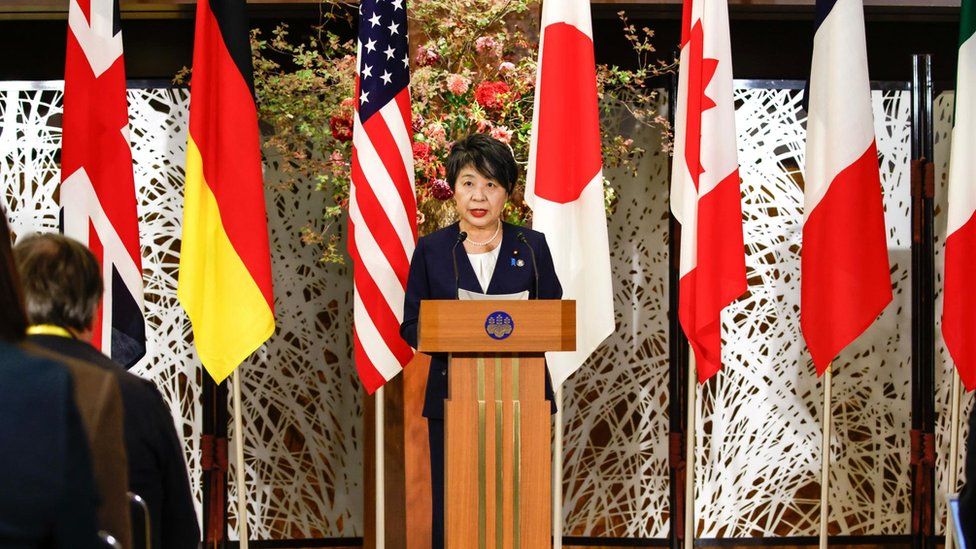G7 Summit: Bloc insists support for Ukraine 'will never waver'
- Published

Leaders of the G7 group of countries have insisted that their support for Ukraine "will never waver", even amid growing tensions in the Middle East.
At a G7 meeting in Japan, the bloc's foreign ministers said they recognised that Russia is prepared for a long war.
They reiterated that they would continue to support Kyiv economically and militarily.
The group of rich countries has been at the forefront of sanctions on Moscow since last year's invasion.
In Tokyo, the governments of the G7 countries - Britain, France, Germany, Italy, Japan, Canada and the US - as well as EU representatives, said that the Israel-Gaza war should not distract from support for Ukraine.
A statement from the Japanese foreign ministry said leaders agreed on the need to impose severe sanctions on Russia and continue to support Ukraine, "even in today's international situation" - a reference to the situation in the Middle East.
American Secretary of State Antony Blinken said the bloc stood "united in [its] condemnation of Russia's war".
But the strong rhetoric masks growing tensions as the war drags on.
Kyiv is increasingly concerned about "Ukraine fatigue" among Western countries eroding its ability to hold off Russian forces.
Further US funding for Ukraine of about $60bn (£49bn) requested by President Joe Biden has been held up by opposition from Republican members of Congress. American officials say current aid will run out within weeks, with potentially disastrous consequences for Ukrainian forces.
Italian prime minister Georgia Meloni made headlines last week when she told Russian pranksters pretending to be officials from the African Union that "fatigue" with the Ukraine war was rising. "We [are] near the moment in which everybody understands that we need a way out," she said.
Slovakian Prime Minister Robert Fico, who took office last month, halted his country's deliveries of weapons to Ukraine upon coming to power.
Internal Ukrainian unity is also showing signs of stress. This month, disagreements between President Volodymyr Zelensky and the commander of the Ukrainian armed forces, Gen Valerii Zaluzhnyi, spilled out into the open after Zaluzhnyi said in an interview that the war has reached a "stalemate".
In response, Mr Zelensky appealed to Ukrainians "not to drown in infighting".
Meanwhile, a Russian collaborator was killed by an apparent car bomb attack in occupied Ukraine on Wednesday.
Mikhail Filiponenko, a former head of a separatist militia, died in an explosion in the city of Luhansk.
Ukrainian military intelligence claimed it was involved in the attack in conjunction with local resistance fighters.
Mr Filiponenko' was previously the target of an attack in February last year, Russian media reported.
Related Topics
- Published24 September 2023
- Published7 November 2023
- Published4 November 2023